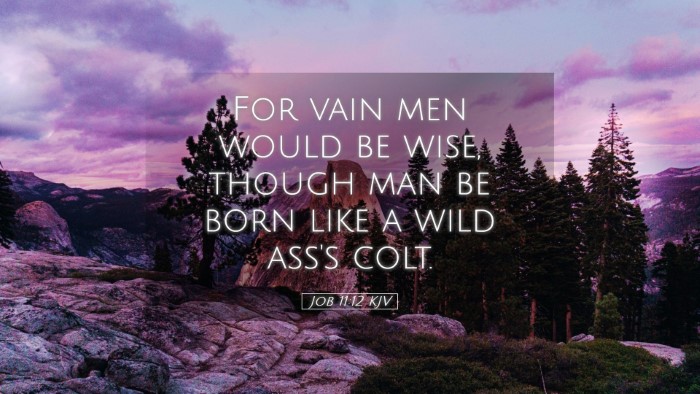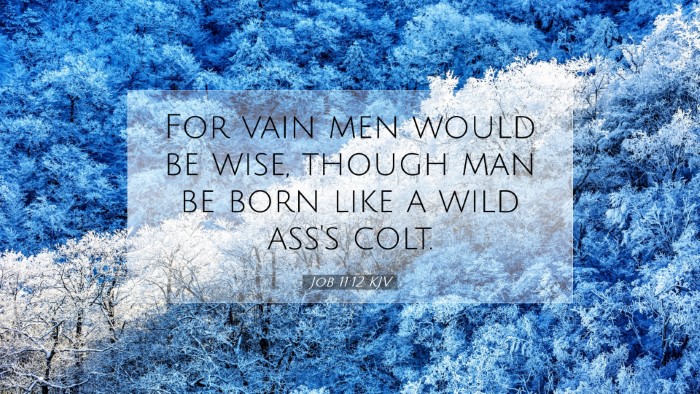Old Testament
Genesis Exodus Leviticus Numbers Deuteronomy Joshua Judges Ruth 1 Samuel 2 Samuel 1 Kings 2 Kings 1 Chronicles 2 Chronicles Ezra Nehemiah Esther Job Psalms Proverbs Ecclesiastes Song of Solomon Isaiah Jeremiah Lamentations Ezekiel Daniel Hosea Joel Amos Obadiah Jonah Micah Nahum Habakkuk Zephaniah Haggai Zechariah MalachiJob 11:12
Job 11:12 KJV
For vain men would be wise, though man be born like a wild ass's colt.
Job 11:12 Bible Commentary
Commentary on Job 11:12
Verse: "For vain man would be wise, though man be born like a wild ass's colt." (Job 11:12, KJV)
Introduction
This verse comes from the discourse of Zophar the Naamathite, one of Job’s friends, who speaks with a blend of truth and error. His aim is to highlight the natural folly of man in comparison to the infinite wisdom of God. The juxtaposition of man’s pride against the reality of his nature is a central theme in this passage.
The Nature of Man's Wisdom
Matthew Henry's Perspective
Matthew Henry emphasizes that human wisdom, which may appear grand in man's eyes, is fundamentally limited. He suggests that man's attempts to seek wisdom, often rooted in pride, lead only to vanity unless grounded in the fear and knowledge of God. Henry notes that like the wild ass’s colt, which is untamed and untrained, so too is man before he comes to an understanding of God’s ways.
Albert Barnes's Insight
Albert Barnes elaborates that the term “vain man” signifies those who are self-deceived into thinking they can attain wisdom apart from divine revelation. He explains that regardless of man’s efforts to pursue knowledge, if his pursuit does not align with humility before God, it remains futile. Barnes points out that the imagery of a "wild ass’s colt" embodies the chaotic and unrestrained nature of human ambition.
Adam Clarke's Interpretation
Adam Clarke offers an analysis of the term “wild ass's colt.” He equates the untamed nature of this creature to human beings who pursue wisdom without submission to divine authority. Clarke maintains that in their vain pursuits, individuals often overlook the inherent limitations of their nature and fail to recognize their dependence on God for true understanding.
The Broader Context
The verse is part of a larger argument where Zophar admonishes Job to repent and seek God's mercy. Zophar’s assertion that wisdom is unattainable without divine insight reflects a significant theological point: that understanding God’s will requires humility and recognition of human limitations. This context underlines the importance of acknowledging our place within God’s creation.
Theological Implications
Humility and Dependence on God
From this passage, theologians and biblical scholars can draw profound insights about the necessity of humility in the pursuit of knowledge. The Bible consistently teaches that “the fear of the LORD is the beginning of knowledge” (Proverbs 1:7), suggesting that any scholarly pursuit devoid of reverence for God is inherently flawed.
Reflection on Human Nature
This verse calls for introspection regarding human nature. The comparison to a wild ass’s colt serves to remind us of our untamed desires and tendencies. The futility of our pursuits when disconnected from divine wisdom emphasizes our need for spiritual maturation and growth.
Practical Applications
For pastors and church leaders, the message of Job 11:12 underscores the importance of guiding congregations to a deeper understanding of God’s wisdom. It encourages the faithful to seek knowledge with humility and to recognize their limitations.
- Encouraging Humility: Teach congregants about the value of humility in their spiritual journey.
- Promoting Dependence on God: Encourage reliance on God through prayer and study of the Scriptures.
- Providing Contextual Education: Equip individuals to understand the narrative of Job, examining the broader themes of suffering, wisdom, and divine sovereignty.
Conclusion
Job 11:12 challenges readers to confront the inherent vanity of human wisdom when separated from a relationship with God. By fostering a mindset of humility and reliance on divine guidance, believers can deepen their understanding of Scripture and grow in their faith journey. The insights from Matthew Henry, Albert Barnes, and Adam Clarke collectively remind us that true wisdom begins by recognizing our dependence on God's revelation.


